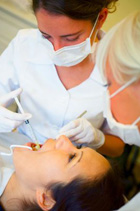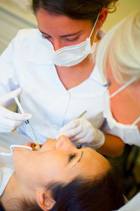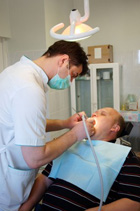 Calling a tooth ‘hopeless’ tends to indicate that it is beyond saving; in years gone by, that would have been the case and the tooth would simply have been removed. But modern dentistry in Leeds is made of more stubborn and tougher stuff these days and will throw everything it can to save it. The term hopeless meant that the tooth was ravished by gum disease, periodontal problems and bad tooth decay but technology has come a very long way over the last fifty years, and there are specialists in every field that can help save the day. Endodontics will attack the problem of damage to the pulp and the roots- treat it with a root canal, and then fill it and maybe stick a crown on top. Deep below the tooth, periodontal disease can be reversed, again by a specialist and regenerate the gum tissue around it. In bad cases of gum disease, new tissue and bone can be grafted in order to overcome any serious loss. Each year, these practises get better and new ideas come into play. The success rates of saving teeth are improving and in today’s surgeries, it would take a lot for a dentist to make the decision to pull out a tooth, at least without trying to save it first.
Calling a tooth ‘hopeless’ tends to indicate that it is beyond saving; in years gone by, that would have been the case and the tooth would simply have been removed. But modern dentistry in Leeds is made of more stubborn and tougher stuff these days and will throw everything it can to save it. The term hopeless meant that the tooth was ravished by gum disease, periodontal problems and bad tooth decay but technology has come a very long way over the last fifty years, and there are specialists in every field that can help save the day. Endodontics will attack the problem of damage to the pulp and the roots- treat it with a root canal, and then fill it and maybe stick a crown on top. Deep below the tooth, periodontal disease can be reversed, again by a specialist and regenerate the gum tissue around it. In bad cases of gum disease, new tissue and bone can be grafted in order to overcome any serious loss. Each year, these practises get better and new ideas come into play. The success rates of saving teeth are improving and in today’s surgeries, it would take a lot for a dentist to make the decision to pull out a tooth, at least without trying to save it first.












 Your dentist in the City of Leeds will be able to diagnose your abscessed tooth with a quick examination with a dental instrument. X-rays may also be needed to determine whether or not the infection has eroded the surrounding bone. With a proper diagnosis, your dentist can begin to treat your abscessed tooth straight away.
Your dentist in the City of Leeds will be able to diagnose your abscessed tooth with a quick examination with a dental instrument. X-rays may also be needed to determine whether or not the infection has eroded the surrounding bone. With a proper diagnosis, your dentist can begin to treat your abscessed tooth straight away.

